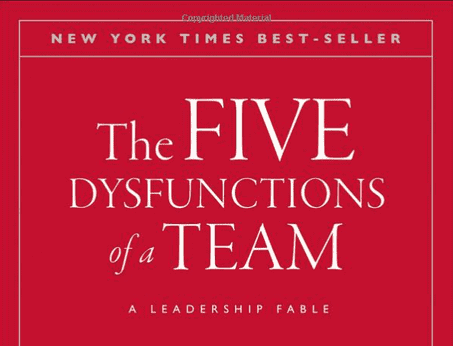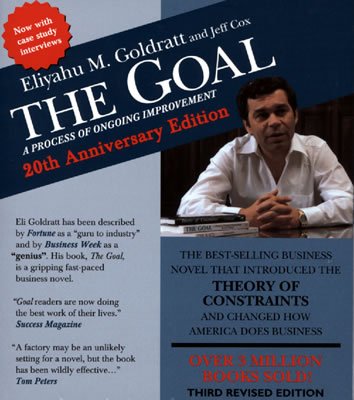Kate Matsudaira: Leadership lessons for managers from a VP of Eng
We recently interviewed Kate hoping to learn some of her secrets. We were not disappointed. She shared some awesome lessons for managers to learn both when they first transition to managing, and when they find themselves managing other managers.
Kate Matsudaira’s Lessons for Managers
Not only does Kate have awesome experience as a VP Engineering and CTO, she was the cofounder of Popforms, which taught managers and individual contributors bite-size lessons to succeed in the workplace. With all that valuable experience, we were excited to learn from her. Below is our interview with her.
[Ed note: This post has been edited for length and readability. Everything in italics is from Kate Matsudaira; regular text is us.]
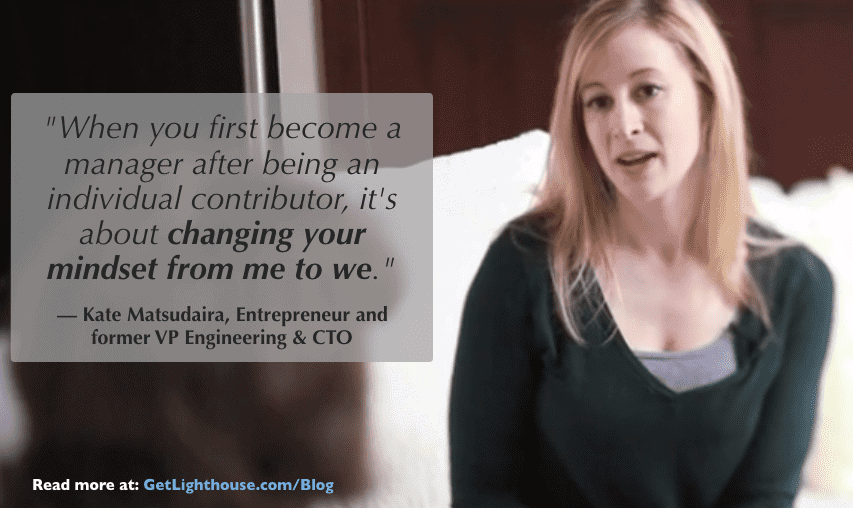
1) What is the biggest mistake people make as they get into leadership & management?
Kate Matsudaira: “I think it’s successfully navigating the big transitions that you go through.
The first transition is when you first become a manager from being an individual contributor. It is going from “me” to “we.”
I felt that it is a hard leap for a lot of people, myself included, because you go from a position where it is really clear to measure your output and effectiveness. It is easy to say like, ‘I got these things done.’ Then suddenly, you are in a position where your effectiveness is based on the productivity and success of the people around you.
And then the second transition, is when you go from being a manager, to a manager of managers. At that point, it is really about more empowerment, dealing with problems, and being a good mentor. It’s also thinking about how you set up guard rails for your people, and thinking more about organizational design and communication both cross-group and cross-discipline.
If you’re managing managers, you have to know more about the business. You have to know more about how your team or your organization fits into the bigger picture.
The habits and things that made you successful in one aren’t necessarily the things that make you successful in others, so you have to constantly re-learn.”
We’ve looked at these challenges before, so for further reading, check out these popular posts:
- 3 Key mindsets for great managers
- Becoming a manager is a career change, not a promotion
- The biggest challenges for first time managers and how to overcome them

2) What is your learning process?
Kate Matsudaira: “One big way that you can learn is through examples. Really look at the people around you that are doing it well, or doing it poorly, and try to learn from their examples.
A lot of us have had a boss or two like, ‘Oh I never want to be like that boss’ or ‘That boss was amazing.’ Try to pick up on the things that are good, and to try to understand why a boss wasn’t good. Really ask yourself:
- What is that boss doing that makes them horrible?
- Why would they do that? What are the motivations?
- What are the underlying causes, or the behavior that led to those problems?
Try to dissect it a little bit because that’s how you really learn.
I’m also a really avid reader, so I pick up a lot of books and read them to learn new skills and insights, too.”
3) What are some are your favorite books you recommend?
Kate Matsudaira: “I have a few I really like. I recently read the book “Turn the Ship Around!” , which was really insightful.
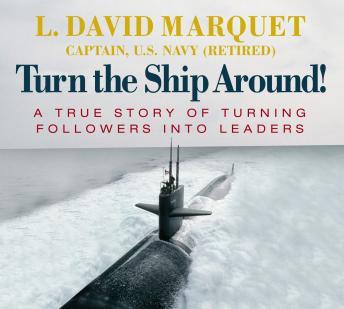
I realized that in my position when people would ask me for help or my opinion, I would tell them, ‘You should do X.’
After reading that book, I changed what I said to, ‘What do you think you should do? Or how do you think this could be better?’ and then putting them in charge. It was really empowering.
Another book that I really liked was, “The Five Dysfunctions of a Team.” It had a major impact for me, because it really helped me think about more than my own team.
When I first became a manager, I always thought about my team and protecting my team. I was a player coach where I made it us against everyone else.
Reading “The 5 Dysfunctions of a Team” really forced me to think about my team as it fit into the company; my team wasn’t battling against these other teams. We needed to collaborate with everyone.
Also, the famous book, “The Goal,” is a favorite of mine. It is really interesting from a process perspective; it is about understanding your bottlenecks, really managing how you’re working, how your team is working, and how to be more efficient,.
While “The Five Dysfunctions of a Team” and “Turn this Ship Around!” are more about about your leadership mindset, “The Goal” is more like hardcore leadership process through people.”
Bonus: A book for anyone, not just managers.
Kate Matsudaira: “A book I really like, and recommend a lot, but it is not necessarily a direct leadership book, is, “So Good They Can’t Ignore You.”
It’s like a new career guide for the modern era. The book provides a great way to think about what you do and how you build your skills. It’s about adapting and opening your mindset to be very strategic about how you work and your career.
The book is definitely applicable for managers, and also to people in general. I think it’s a really good handbook on how to work, and how to think about your work.”
How do you find time to read?
Kate Matsudaira: “I listen to a lot of audio books when I’m driving. Audio books give you a lot of options where you can listen to them: when you’re running on the treadmill, going for a walk, or on your commute. Anywhere that you’re in a situation when you can focus and listen for awhile works.
The other thing that is really cool about audio books is there’s lot of really good alternatives to listen to like podcasts, lectures, etc. So if you aren’t into books, there are tons of other options.”
That’s a great idea for people that maybe don’t have an easy time or routine to read.
Let’s say you hear a great insight as you’re listening to an audio book, like, ‘oh, that’s interesting, I should do something about that.’ Or, ‘I want to apply that.’ What do you do?
Kate Matsudaira: “What I do is keep an Evernote, and use it like a visual notebook. When I get to the office, I ask myself: ‘What are the 3 things I learned,’ or ‘What is the take-away from what I listened to today?’ By doing this, I feel like it really helps me remember what I hear.”
Looking for more book recommendations? Here’s a few of our favorites for managers.

4) What do you think are some key habits for managers of individual contributors?
Kate Matsudaira: “For starters, I think 1-on-1s are really important. Especially if you’re a new manager, getting to know your team and touching base even when you don’t need to is important.
The second thing is really thinking about all sides of communication. How you communicate inside your team, how your team is communicating to you, and how you’re communicating that outward to your peers and to your boss are all critical.
You don’t want to communicate only when things go really well or really poorly. You really want to show all the progress, and all the good things that are happening.
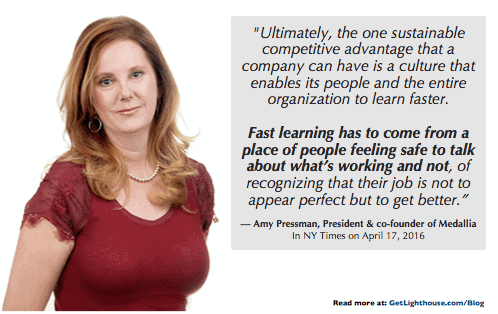
Stay up to date.
Another habit is really staying abreast of current trends, tools, and processes. It’s important, whether that’s the way you’re doing things, or the newest technology or language.
I think it is really important as a leader to know about what’s going on. Even if you don’t know all the details, just to really be informed of those trends because there are going to be people on your team bringing it up to you.
Hopefully, you already know a little bit about it, and you can talk about it and you can decide if it’s worth spending more time on. You’ll also be setting a good example from your team to continuously learn.”
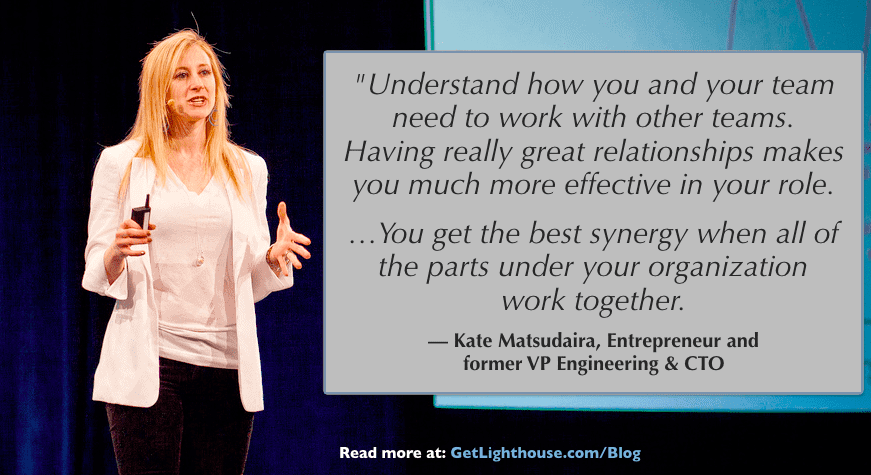
5) What are key habits for managers of managers?
Kate Matsudaira: “For manager of managers, I think the big difference is that you have to look at your job as cross-disciplinary. You should have 1-on-1’s with other groups, other teams, other organizations, and other managers that are doing work that interface with you.
You have to know how you fit with the other parts of your organization. Understand how you and your team need to work with other teams. Having really great relationships makes you much more effective in your role.
It also keeps your finger on the pulse of the company. You should know the answers to questions like:
- What are the company’s goals?
- What is the company’s strategy?
- How does your team or organization fit into that?
The second most important thing is really creating a strong culture. Make it feel like a team, so that people really work together. You get the best synergy when all of the parts under your organization work together.
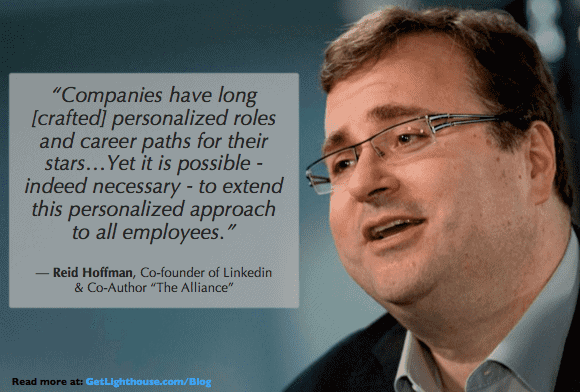
Third, you have to always be figuring out how you develop your people. You should ask yourself:
- How do you push them?
- How do you recruit?
- Do you have succession plans and growth plans?
You should be making these questions part of your day-to-day thinking, Ask yourself how you can help the people around you grow, and help build them up.
A sign of a good manager is that people under them are growing and doing better, moving on to bigger and better things, and getting promoted into new roles.”
Thinking about what to do as a manager of managers? For further reading, check out:
- 3 Battle-tested approaches to growth conversations
- How to help your people grow without promoting them
- Keys to help new managers succeed
A big thanks to Kate for taking the time to speak with us and share her lessons. If you have follow up questions, leave a comment and we’ll ask Kate to weigh in.
If you’d like to learn more about Kate Matsudaira or more leadership lessons from her, check out her blog here.

